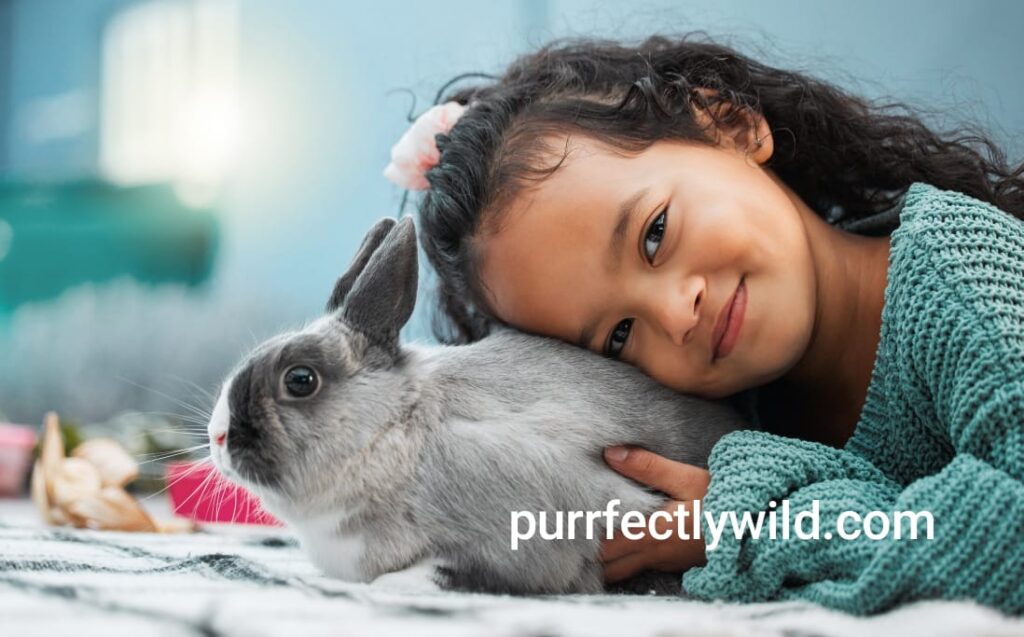Due to the harsh environment where our day-to-day lives already deal with stress and anxiety, Emotional Support Animals (ESAs) have become essential in combating these two feelings. Dogs represent the highest percentage of ESAs and cats too, but many other animals can also offer emotional support to aid individuals in working through more difficult times. For as poorly understood and unappreciated a chap this animal gets, the rabbit is an obvious candidate. The gentle nature, docile demeanor, and relatively low maintenance care aspect of the rabbits are not only qualities that make them a great pet but these features have helped with raising awareness for rabbits as an emotional support animal.
Rabbits as Emotional Support Animals
Rabbits are an excellent combination of qualities that make them the perfect animal for emotional support. Nothing like their size, soft fur and they were quiet naturally, it just soothed them. Rabbits unlike dogs need to be walked constantly and are low-maintenance animals. Additionally, this also makes them ideal for those people who have constraints in terms of time or energy (or mobility) as a pet owner and find other animals difficult to commit.
Rabbits are also one of the most intuitive pets you can have. He will perceive the owner’s feelings and often react that way too. They have a soothing effect on the mind, which means one can release all their tension and feel peace. Just the act of stroking the soft fur of a rabbit can be therapeutic for those with any mental health issues, it helps provide comfort perhaps by remaining in touch with something perceptive that is physical and grounding them to the here and now.

Rabbits As Therapy Animals
An emotional support rabbit can, of course, also improve a person’s well-being in other ways besides calming down. Research shows that petting animals may lower cortisol levels, the hormone associated with stress. Not only does petting a rabbit relieve blood pressure, thumb heart rates lower and one feels overall better as well. As a consequence, it seems that anxiety disorder dragons and depression demons lose their grip combating these forms of mental illness.
Rabbits are also business-as-usual animals and they can be especially good for someone struggling with mental health issues. Some people may find that they eat better when feeding, grooming, and playing with a rabbit because it gives structure to the day. Caring for an animal can also help increase levels of self-esteem in those who are depressed.
Clawson, a TBI survivor herself, discusses how taking care of rabbits has significantly helped in her recovery. Looking after bunnies has been good for me for my physical, mental, emotional, and social” In addition, it also helps me exercise my balance and coordination skills since getting on the floor to pet/play with/fulminate Good Doggo requires some agility. Picking up their toys, cleaning their litter boxes, and shaking out those beds are also my strength-building exercises.
But that’s not all. On days when I am arranging their vet appointments, managing and dispensing Bennie’s meds, or any changes to the diet that benefit them, Clawson comments “These are the aspects where my thinking skills come into play. Lisa says, “Then I see them being silly or simply napping and my problems go away for a while as well.
Clawson lives in Utah and is always keen to chat with other rabbit owners, rescuers, or vets. This is the one thing that has helped a lot with her social anxiety. However, individuals suffering from a variety of conditions—including addiction, autism spectrum disorders, dementia or Alzheimer’s disease, and multiple sclerosis as well as stroke survivors with spinal cord injuries—are also “prescribed” animal-assisted therapy that usually involves tending to rabbits.
Rabbit expert Amidon says, “Since rabbits vary in temperament there’s usually a rabbit to fit any person or family—especially through a rescue group that knows its animals”. But she continues to say, “There are also rabbits who use a lap — love it and feel comfortable like they’re getting petted because some people can sit with this loneliness of feeling or openness between them. Some rabbits are playful, which can engage a new owner in activities similar to clicker training. For those dealing with sensory disorders, it allows a safe way to bond without getting overly stimulated.

Bonding with a Bunny: Building Emotional Connections
A rabbit can even form very deep relationships with an owner. Rabbits are social animals and they enjoy company, too — bonding with you will take greater patience but with a little time and care… rabbits can be exceptionally loving pets. Rabbits are generally not as demonstrative in their affection (vis a vis dogs, who might slobber all over your face trying to show you how much they love you), but still find ways including nudges and licks just like dogs or by doing things that include sitting nearby.
For people who have problems with social interactions, this kind of bond can be even more important. A rabbit can provide unconditional love and other forms of companionship, which might give you a sense of security that is hard to find in any other source. As the rabbits are playful, this can help in reducing stress which is one boost to their owner’s mental and emotional health.

Considerations for Choosing a Rabbit as an ESA
If adopting a rabbit as an emotional support pet or therapy animal, the correct choice MUST first be found.
Each year at Easter, scores of bunnies, and their chick and duck sidekicks are bought by well-meaning individuals only to be turned into animal shelters mere weeks later. Rabbits are the 3rd most frequently surrendered and euthanized animals in shelters. The House Rabbit Society is doing a commendable job trying to eradicate the whole perception of rabbits as beginner animals and cost-effective Easter gifts for children.
While Bunnies such as House Pets and ESA can be wonderful companions, we hope everyone will take minutes to starve rabbits for consideration during quick holiday shopping sprees.
Rabbits typically live 8 –14 years, so having one is a super long-term commitment!
For instance, rabbits need to be spayed or neutered because they can get cancer and have all kinds of bunnies. In the absence of spaying within 4-6 years, uterine cancer can develop in up to 80% of female rabbits.
They eat hay, pellets & fresh veggies.
Rabbits should be kept indoors for best safety and health, with 2-4 hours of exercise daily in a bunny-proofed area.
They are high maintenance and can only be seen by a vet who is an exotic animal specialist, which could cost you.
Rabbits need to be given a rabbit hemorrhagic disease 2 (RHDV2) vaccine once per year.
But in reality, rabbits are not exactly low-maintenance animals. Prey animals Preys require as much care if not more compared to dogs and cats, so it may take time for them to feel safe around people.
Final Thoughts
In short, rabbits quietly provide a sort of emotional therapy that is seldom considered. This is a perfect choice because they have gentle and calm behavior, minimal grooming needs. They may not be as conventional as dogs or cats, but rabbits could definitely bring the amount of love and companionship that breathe happiness in their owners mental and emotional health. The more people take note of rabbits as a potential emotional support, the chances are these cute furry critters might hop their way into minds and homes around experience seekers.


